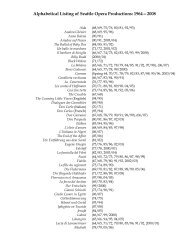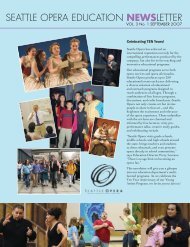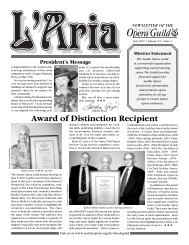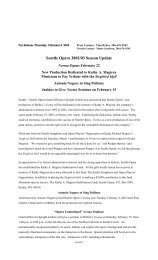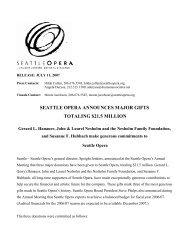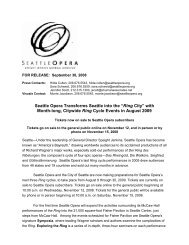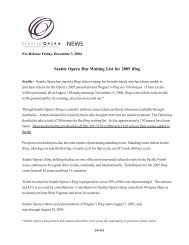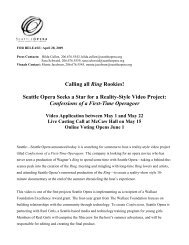You also want an ePaper? Increase the reach of your titles
YUMPU automatically turns print PDFs into web optimized ePapers that Google loves.
Long Story Short<br />
A relationship of five years will end when this<br />
phone call ends...so let’s keep talking.<br />
Who’s Who?<br />
Elle (“She”) is young, elegant, and unhappy<br />
about being dumped.<br />
On the phone with her is a man she calls “Chéri”<br />
(the cherished one), as well as telephone<br />
operators and miscellaneous other callers. She<br />
speaks with Chéri about her friend Marthe and<br />
the dog.<br />
Where and When?<br />
A woman’s bedroom, probably in Paris, midtwentieth<br />
century.<br />
What’s Going On?<br />
He left her three nights ago, and tonight they’re<br />
on the phone, trying to say goodbye. But how to<br />
end it properly—particularly when it’s so hard to<br />
get a good connection? The call keeps getting<br />
dropped, random people keep eavesdropping on<br />
the conversation, and the two of them have a<br />
hard time telling one another the truth.<br />
“Yes, I had a hard time sleeping last night, and<br />
took a pill,” she tells him. “Then, this morning,<br />
Marthe came by early.” She goes on to lie about<br />
what she’s wearing, and they are almost flirting<br />
when once again the line cuts out. She calls his<br />
house, only to discover that he’s not there—he<br />
must have been calling from somewhere else.<br />
When he calls back, and continues to lie—“Oh,<br />
that music you hear? No, I’m not at a party...<br />
that must be the neighbors, playing their<br />
gramophone”—she is emboldened to tell him<br />
the truth: she isn’t dressed up, she hasn’t had<br />
dinner, and she didn’t take one pill, she took<br />
all of them. When Marthe came, she brought a<br />
doctor, and the woman’s suicide attempt failed.<br />
But after five years of a relationship, it’s terrible<br />
to be alone; even the woman’s dog understands<br />
something is terribly wrong. When she comes to<br />
understand that her lover has lied to her only in<br />
an attempt to lessen the hurt, his kindness gives<br />
her the strength to tell him, “Go ahead, hurry,<br />
hang up. Do it quickly. I love you....”<br />
History of a Bad Connection<br />
If you’ve had trouble with your cell phone carrier,<br />
or an unreliable wireless router, you’ll identify<br />
with the protagonist of La voix humaine, whose<br />
attempt to make an important phone call is<br />
continually thwarted by the crummy phone<br />
service where she lives. Much of the dramatic<br />
tension and humor of La voix humaine come<br />
from the constant interruptions, which were a<br />
familiar feature of urban telephone systems into<br />
the mid-twentieth century.<br />
This opera takes place long before area codes,<br />
back in the days of exchange names; for instance,<br />
Elle, trying to dial her Chéri, asks her operator<br />
to dial “Auteuil 04/7.” Not until after World War<br />
II did modern telephone numbering systems<br />
come into use, and it took decades for them to<br />
become ubiquitous. Although Poulenc wrote the<br />
opera in the late ’50s, he was clearly delighted<br />
to remember the unpredictable phone service of<br />
his youth—witness the rattling xylophone in his<br />
score each time the woman’s telephone rings.<br />
About the Writer and<br />
CoMPoser<br />
La voix humaine is a play written in 1930 by<br />
Jean Cocteau and set to music in 1959 by Francis<br />
Poulenc. Cocteau and Poulenc, who first met in<br />
1917, were both major figures<br />
in twentieth-century art, music,<br />
poetry, theater, dance, and film.<br />
Given their varied interests,<br />
limitless energy, and the<br />
extraordinary times they lived<br />
through, the world of French<br />
culture swirled around these<br />
two figures for four decades.<br />
When they first met, Cocteau<br />
(born 1889) was a hyperactive<br />
young artist and arts publicist,<br />
and Poulenc (born 1899) was<br />
a musically inclined teenager<br />
from a well-to-do family. The<br />
Rite of Spring had turned the<br />
Paris arts scene on its head a<br />
few years previously: Stravinsky’s<br />
wild score so polarized<br />
the musical world that when<br />
Poulenc applied to study at the conservative<br />
Paris Conservatoire, the composition teacher<br />
who judged his work screamed, “I see you’re a<br />
follower of the Stravinsky and Satie gang. Well,<br />
goodbye!” and threw him out the door. The<br />
hedonistic lifestyle associated with the Ballets<br />
Russes, and others in the world of the arts at<br />
the time of the World War I, emboldened these<br />
two artists, both of whom were gay, to pursue<br />
authentic love lives, whatever society might<br />
think. Both had on-again-off-again relationships<br />
with the Catholic Church; both endured<br />
the Fascist take-over of France during World<br />
War II (and both have been criticized for not<br />
standing up heroically to fight the Nazis); and<br />
both died in 1963, well-respected old lions who<br />
had become role models to later generations of<br />
artists.<br />
Cocteau may be best known in the United<br />
States today for his films, particularly his dreamy<br />
Beauty and the Beast and his three Orpheusinspired<br />
films: Blood of a Poet, Orpheus, and The<br />
Testament of Orpheus (all of which star his lover,<br />
Jean Marais). But he was equally productive as<br />
artist, poet, novelist, critic, and designer. He<br />
wrote La voix humaine in 1929, the same year<br />
that he described his recovery from addiction<br />
in the book Opium, Diary of a Detoxification.<br />
“Portrait of Jean Cocteau (with multiple hands),” Philippe Halsman, 1948<br />
2012/13 Season at <strong>Seattle</strong> <strong>Opera</strong> 27




